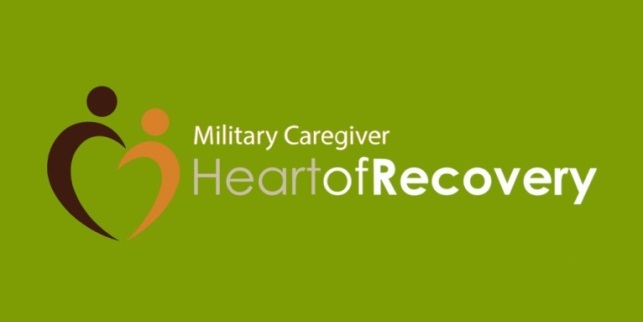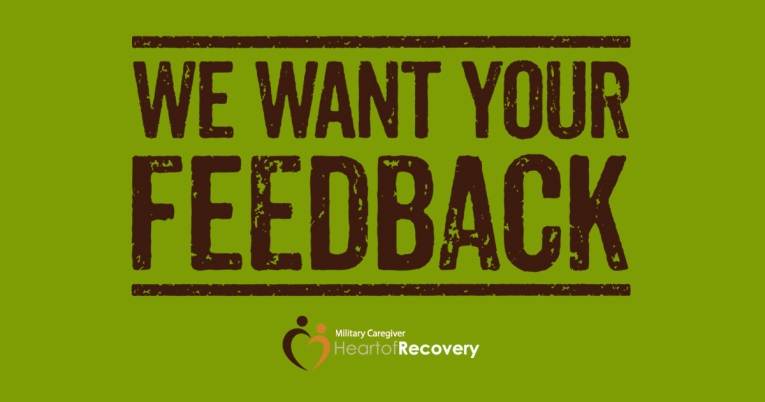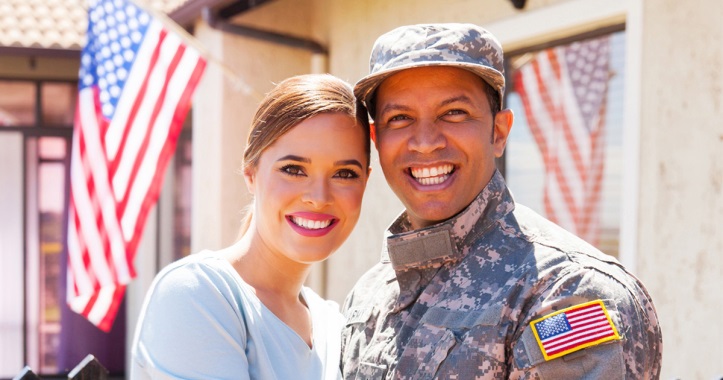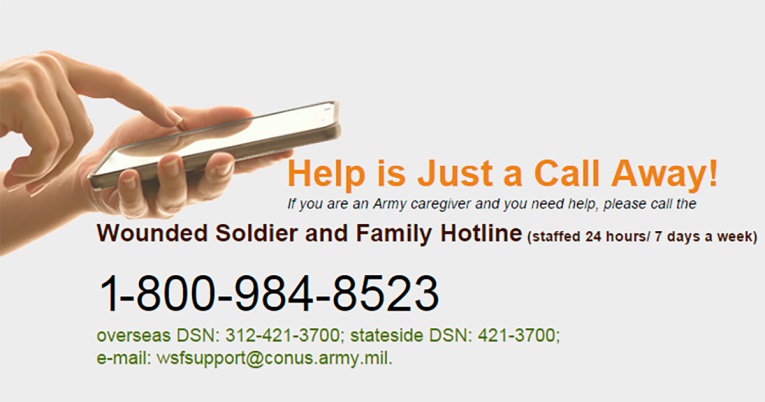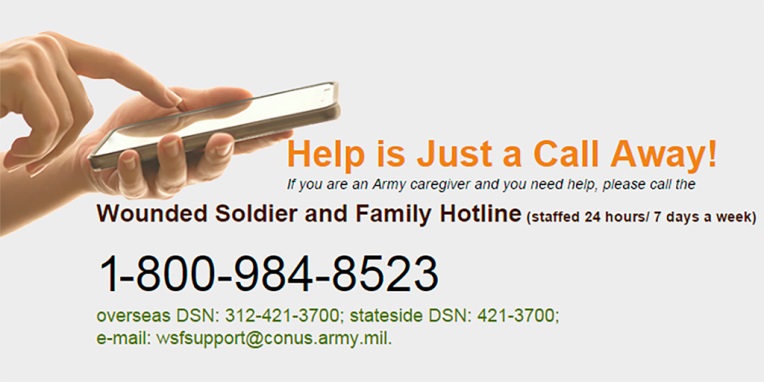Care Messaging Plan
Care Messaging Plan for OMB 4-30-18.docx
Heart of Recovery
Care Messaging Plan
OMB: 0702-0143
Military Caregiver Survey Messaging Plan
Survey Background
The U.S. Army Public Health Center (APHC) is conducting a survey to better understand the unique needs and experiences of Military caregivers. The overall intent of the survey is to provide information for program managers to develop resources and support that will improve outcomes for wounded, injured, or ill Soldiers and their caregivers. Military caregivers’ first-hand experiences are necessary to determine the needs of the Military Caregiver population. Without directly surveying Military Caregivers, it’s impossible to understand the level of caregiver burden Military caregivers experience and the training and other assistance they would like to receive in the future. Understanding the current caregiver burden and Military caregiver needs helps to ensure that any future caregiver resources developed will be utilized and set up to be potentially effective.
Survey Target Audience
All Military caregivers taking care of a Service Member at:
Fort Bragg
Fort Sill
Joint Base San Antonio (JBSA)
Joint Base Lewis-McChord (JBLM)
Military caregivers are defined as anyone who provides unpaid care and assistance (except for the receipt of Special Compensation for Assistance with Activities of Daily Living (SCAADL) benefits) for, or manage the care of, someone who is at least 18 years old and has an illness, injury, or condition for which they require outside support. Support may include help with tasks such as personal care, bathing, dressing, feeding, giving medicines or treatments, help with memory tasks for someone with brain injury, help coping with symptoms of Posttraumatic Stress Disorder (PTSD), transportation to doctors’ appointments, or arranging for services, etc. A Military caregiver is not required to live with their care recipient. Care and assistance are considered unpaid if services are provided without receiving financial compensation.
Targets for Survey Promotion and Completion
Survey administrators estimate a total of 83,320 Soldiers are assigned duty at the four survey sites (based on Sep 2016 projections). Using estimates from the RAND Military Caregiver study, 3% of Active Duty Soldiers have a Military caregiver and each care recipient has an estimated average of 2 Military caregivers. Therefore, the total number of potential Military caregivers on the four installations is estimated at 5,000. In order to reach the survey response rate goal of 15%, or 750 respondents, attempts will be made to reach all potential respondents at the four installations.
Survey Promotion
Reaching the caregiver population has unique challenges. Caregivers may not be Army beneficiaries and may not live on the installation or routinely access the installation. Therefore, in order to maximize the reach of the survey link to all potential survey respondents, multiple messaging strategies and channels will need to be implemented.
Coordination
An APHC-designated Public Affairs Officer (PAO) will coordinate with installation PAOs and Medical Treatment Facility (MTF) PAOs 6-8 weeks prior to the release of the survey. Concurrently, coordination with the installation Health Promotion Officers will occur and be facilitated by the Military Caregiver Heart of Recovery (MCHR) program lead. Coordination will include a discussion and timeline regarding the messaging activities and strategies and messaging products identified below.
Website
A MCHR website (http://militarycaregiver.health.mil) has been developed and is currently available to the public. The website supports survey efforts by providing potential survey respondents with information about caregiving, purpose and goals of the initiative, and a hotline number for caregivers who need assistance. A message about the survey and link to the survey will be posted on the website when the survey is approved and subsequently released. See Appendix A for website screen shot and website URL.
Social Media Messaging
Digital promotion of the survey can be used by local points of contact (POC) at each survey location to promote the survey. Local POCs who manage social media accounts should be identified and coordinated with in advance of the survey opening. Social media accounts at each survey location can be identified by searching on Facebook and Twitter. Public Affairs Officers at each survey location may be able to assist as well. The following is a list of different types of social media accounts that may be active at each location and could help to reach Military Health System (MHS) beneficiaries, Family Readiness Groups, Warrior Transition Unit, Military Treatment Facility (MTF), Army Wellness Center (AWC) and Morale, Welfare and Recreation (MWR), etc..
See Appendix B for draft social media messaging.
Brochures and Posters
APHC will coordinate, print and ship brochures and posters to MTFs at the four installations to display or distribute. The posters and brochures provides potential survey respondents with similar information as the website to include information about caregiving, background information about the initiative to include purpose and goals, and hotline information. There will also be an insert provided with the brochure that discusses the survey in detail. See Appendix C for Military Caregiver Heart of Recovery Brochure and insert, and Appendix D for the MCHR Posters.
Installation Newspaper Article
The APHC PAO will develop a press release and coordinate with the four installation newspapers to support the development of a news article. The press release will be built using background information from the MCHR Information paper and include the survey link for potential respondents to access the survey. See Appendix E for MCHR Press Release and Article.
Emails
APHC will distribute content of an email for distribution to email mailing lists of Family Readiness Groups to local PAOs or MTF PAOs for distribution. Additional groups that may contain caregiver populations may also be identified. Potential respondents will self-select after being reached by the email. See Appendix F for Sample email to potential respondents.
Local Cable Channel Public Service Advertising
If funding is available, local cable channels that provide service to the four installations will be identified for the production and dissemination of the advertisements to the target population. The target audience will be identified and link to the MCHR website provided for survey completion. Advertisements will include similar information as identified in the Sample email located in Appendix F.
Execution Matrix
TASK |
PURPOSE |
AUDIENCE |
CHANNEL |
TIMELINE |
LEAD |
Cost Estimate (pending funding availability) |
Coordinate with MTF and installation PAOs 6-8 weeks prior to survey release |
Coordination and synchronization with local installations |
PAOs |
TCON |
6-8 weeks prior to survey release |
APHC PAO or designee |
In-kind labor
|
Coordinate with HPOs/CHPCs |
Coordination and synchronization with local installations |
HPOs/CHPCs |
TCON |
6-8 weeks prior to survey release |
MCHR lead or designee |
In-kind labor |
Develop Press Release |
For use by newspaper writer to develop article for local installation newspaper. |
Caregivers |
Local Newspaper article |
3 weeks prior to survey release |
APHC PAO |
In-kind labor |
Update website with survey information |
Provide survey link on website |
Caregivers |
Website |
1 day prior to survey release |
Health Communication Specialists |
In-kind labor |
Develop social media content |
Develop social media messages and coordinate graphics |
Caregivers |
Social Media |
4-6 weeks prior to survey release |
Health Communication Specialists |
In-kind labor |
Coordinate and execute social media content with local POCs |
Identify social media accounts at each pilot site location that can help promote the survey. Identify POCs for each social media account. Provide POCs with social media messages and files. |
Social media account managers |
Social Media |
4-6 weeks prior to survey release |
Program lead and/or POC responsible for managing survey promotion and execution |
In-kind labor |
Distribute email draft to HPOs/PAOs/Other for further distribution to FRG groups |
Access to FRG groups and other special installation groups that may contain caregivers |
Caregivers via FRG groups |
2 weeks prior to survey release |
PAO |
0 |
|
Distribute MCHR brochure |
Background information about the initiative for MTF waiting areas |
Caregivers |
1) Order Print copies of brochure 10 weeks prior to release of survey and ship directly to MTF PAOs 2) PAOs distribute brochures in waiting areas. |
Health Communication Specialist/ HIP e-catalog administrative assistant |
Printing and shipping $500.00 |
|
Develop cable advertisement/Public Service Announcement (PSA) |
Cable may provide additional reach to Military caregivers that may not access the installation |
Caregivers |
Cable TV |
120 days prior to release of survey identify contracting or other requirement for cable advertising/PSA. Air the advertisement during the time the survey is open. |
|
$5000.00 |
Appendix A: MCHR Website Screenshot
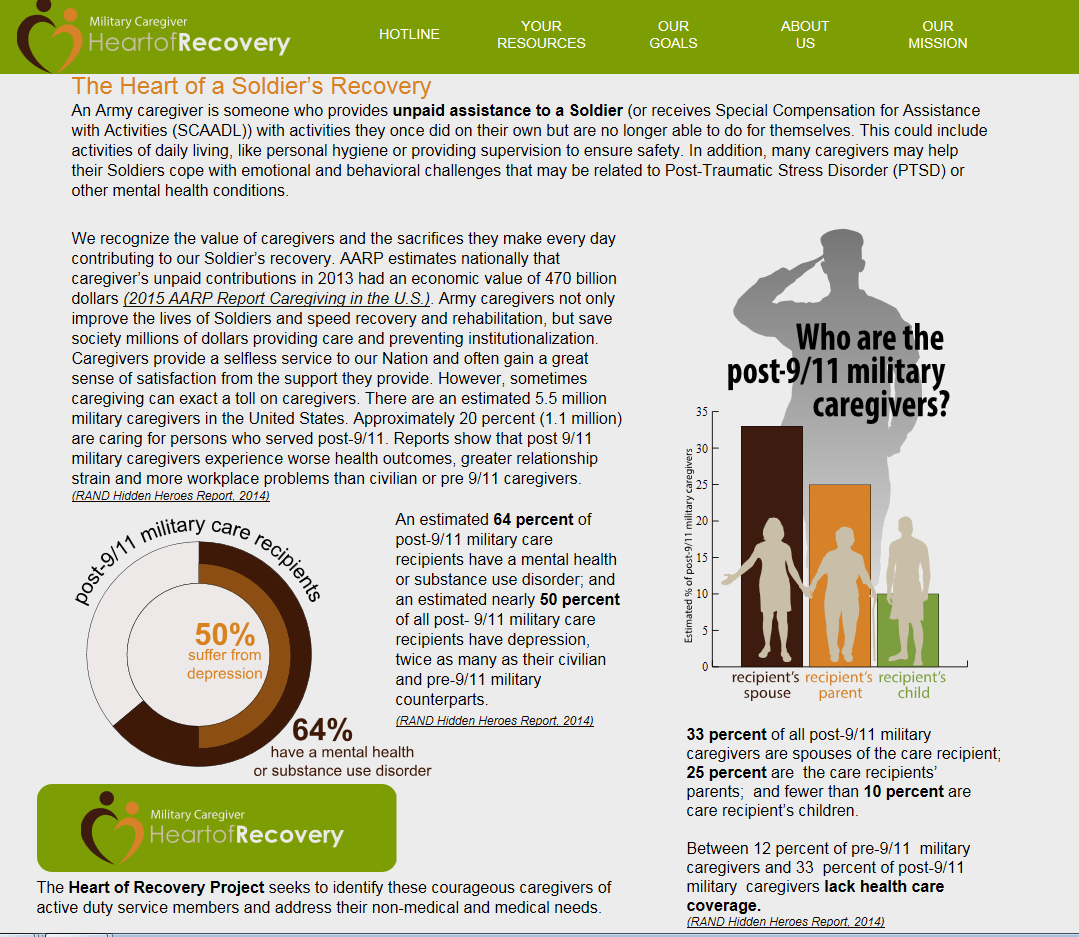
http://militarycaregiver.health.mil
Appendix
B: Draft Social Media Messaging
|
Picture |
Purpose |
|||
|
|
|
Promote the Military Caregiver Heart of Recovery Program |
You are the Heart of a Soldier’s Recovery!
To find out more about #MilitaryCaregivers visit: https://usaphcapps.amedd.army.mil/cfc/ |
#MilitaryCargivers are the Heart of a #Soldiers Recovery! https://usaphcapps.amedd.army.mil/cfc/ |
You are the Heart of a Soldiers Recovery!
To find out more about #MilitaryCaregivers visit: https://usaphcapps.amedd.army.mil/cfc/ |
|
|
|
Increase awareness and understanding of who is considered a caregiver. |
#MilitaryCaregivers provide non-professional assistance to Soldiers. These family members or friends help with activities Soldiers once did on their own but are no longer able to do for themselves.
http://militarycaregiver.health.mil/ |
#MilitaryCargivers provide non-professional assistance to #Soldiers with activities they once did on their own: http://militarycaregiver.health.mil/ |
#MilitaryCaregivers provide non-professional assistance to Soldiers. These family members or friends help with activities Soldiers once did on their own but are no longer able to do for themselves.
http://militarycaregiver.health.mil/
|
|
|
|
Promote survey. Right click the graphic to save to your computer. |
The Heart of Recovery Project was established to help take care of #MilitaryCaregivers. By taking this survey you will help us understand the challenges caregivers face and resources that would be helpful.
To take the survey visit: militarycaregiver.health.mil/survey |
Take this survey to help us understand the challenges #MilitaryCaregivers face: http://militarycaregiver.health.mil/survey |
No Instagram post will be planned in advance to advertise the survey.
A typical Instagram post cannot include a clickable link.
|
|
|
|
Promote survey. Right click the graphic to save to your computer. |
Being a #MilitaryCaregiver can be physically and emotionally challenging. A survey is currently being conducted to determine the needs of military caregivers.
To take the survey visit: militarycaregiver.health.mil/survey |
A survey is currently being conducted to determine the needs of #MilitaryCaregivers: militarycaregiver.health.mil/survey |
A typical Instagram post cannot include a clickable link.
No Instagram post will be planned in advance to advertise the survey. |
|
|
|
Promote survey. Right click the graphic to save to your computer. |
A #MilitaryCaregiver supports the health, well-being, and resiliency of Soldiers. However caregivers’ health and well-being are equally important to the success of families and the military.
Take this survey to let us know what support you need: militarycaregiver.health.mil/survey |
A #MilitaryCaregiver supports the health, well-being, and resiliency of Soldiers. Take this survey to let us know what support you need: militarycaregiver.health.mil/survey |
A typical Instagram post cannot include a clickable link.
No Instagram post will be planned in advance to advertise the survey. |
|
|
Caregiver Video |
Promote the survey.
The file can be sent to POCs at each pilot site using the Safe Access File Exchange.
The video file can be found at: P:\shared\VI_Temp\Graham\Social Media\FY18 Graphics\October Graphics\Family Caregiver Month\Caregiver Survey |
Do you provide unpaid assistance for a wounded, injured, or ill Soldier?
Take our anonymous survey to help us better support you and your Soldier!
militarycaregiver.health.mil/survey
#MilitaryCaregivers |
Do you provide unpaid assistance for a wounded, injured, or ill Soldier? Take this survey: militarycaregiver.health.mil/survey
|
|
|
|
|
Increase awareness on what it means to be a caregiver and the hotline resource. |
Many family members and friends help Soldiers complete tasks on a daily basis. Helping a Soldier is rewarding but can be challenging.
The Army Medicine Hotline can connect you to resources and support.
Call: 1-800-984-8523
|
Taking care of a #Soldier can be stressful. Call the hotline to get connected to resources and support: 1-800-984-8523 |
Many family members and friends help Soldiers complete tasks on a daily basis. Helping a Soldier is rewarding but can be challenging.
The Army Medicine Hotline can connect you to resources and support.
Call: 1-800-984-8523
*The graphic used on Instagram will have less information. Instagram requires a square image and text does not come across as well.
|
|
|
|
Promote asking for help and the hotline resource. |
Caring for a Soldier can be physically and emotionally draining.
Help is Just a Call Away! 1-800-984-8523 |
Caring for a Soldier can be physically and emotionally draining. Call: 1-800-984-8523
|
Caring for a Soldier can be physically and emotionally draining.
Help is Just a Call Away! 1-800-984-8523
*The graphic used on Instagram will have less information. Instagram requires a square image and text does not come across as well.
|
|
|
|
Promote asking for help and the hotline resource. |
Being a #MilitaryCaregiver is tough. Help is just a call away.
1-800-984-8523 |
Being a #MilitaryCaregiver is tough. Help is just a call away.
1-800-984-8523 |
Being a #MilitaryCaregiver is tough. Help is just a call away.
1-800-984-8523
*The graphic used on Instagram will have less information. Instagram requires a square image and text does not come across as well. |
Appendix C: Draft MCHR Brochure
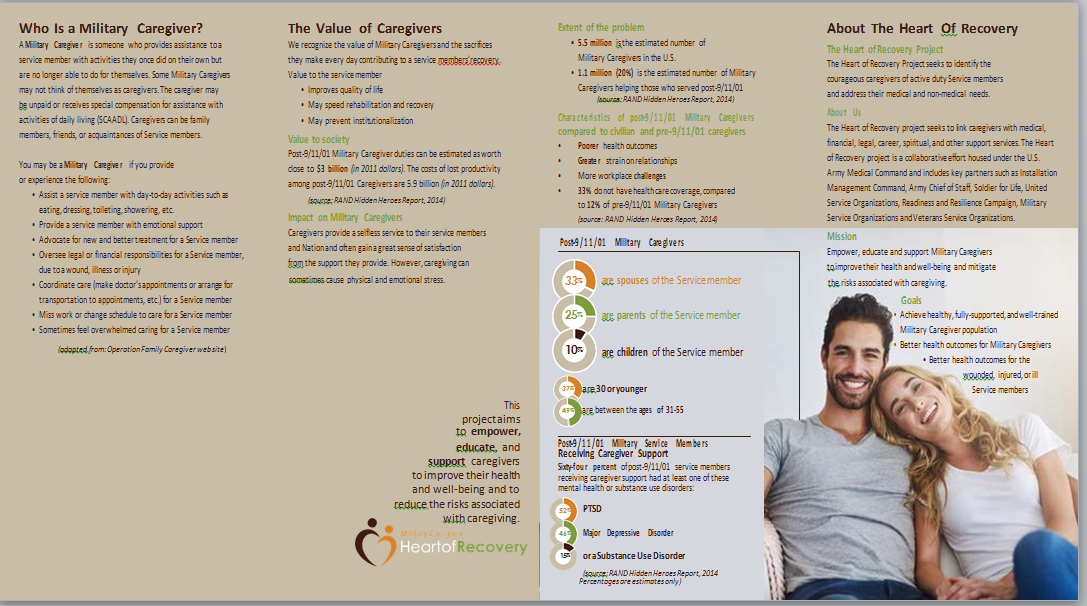
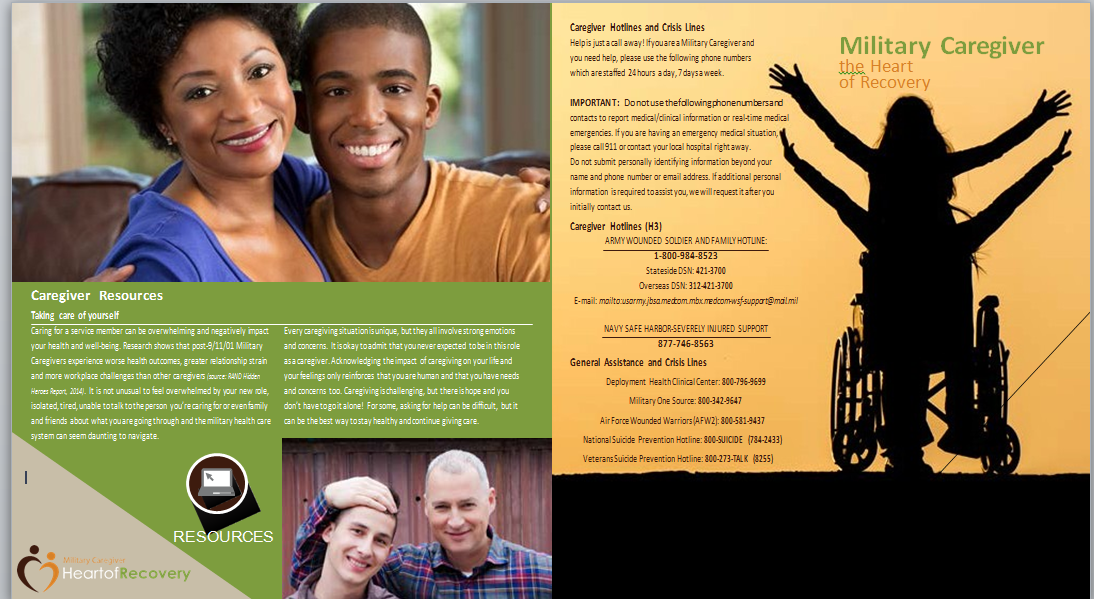
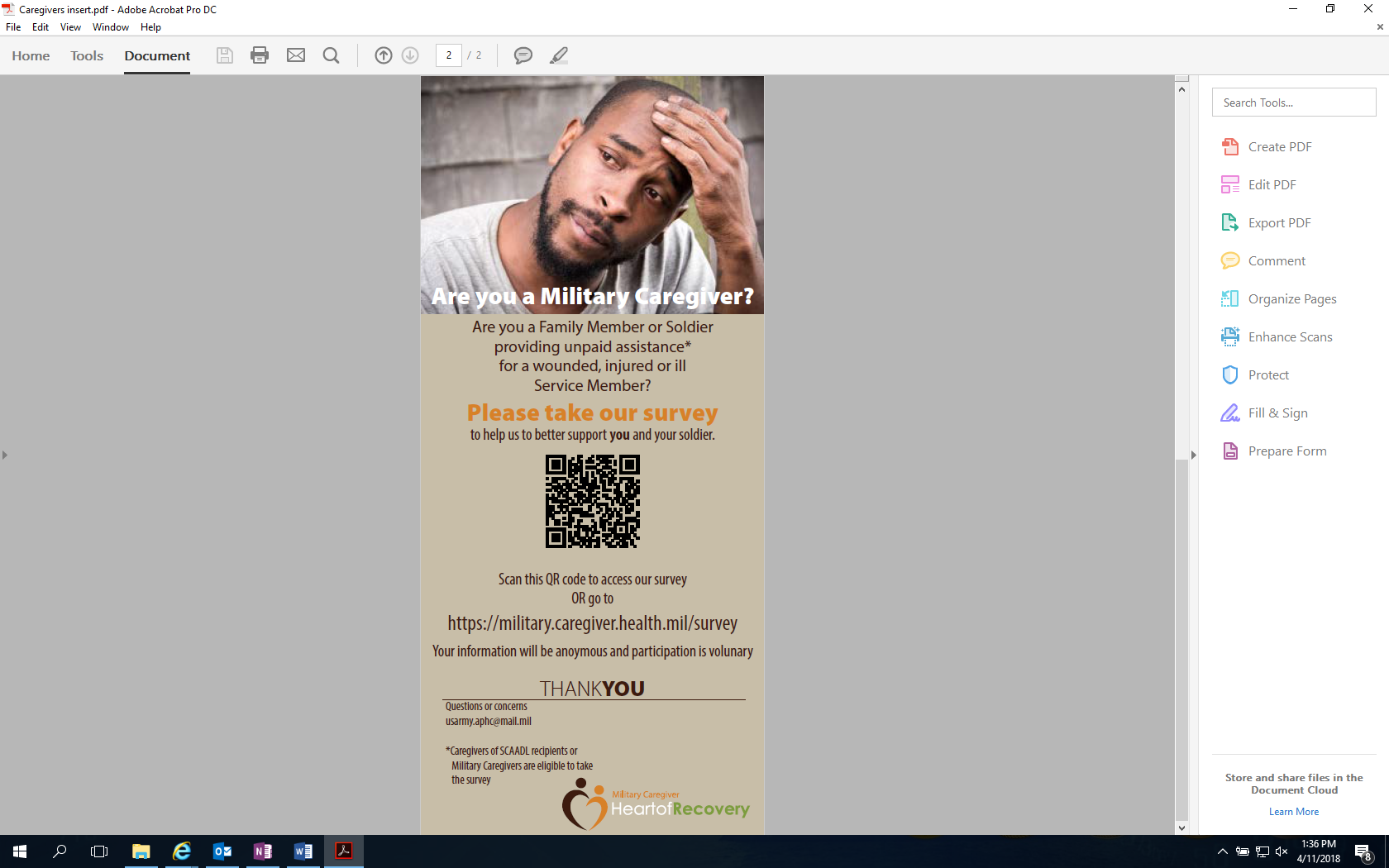
Appendix D: MCHR Posters
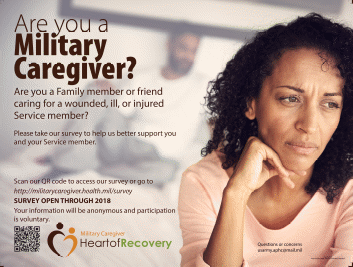
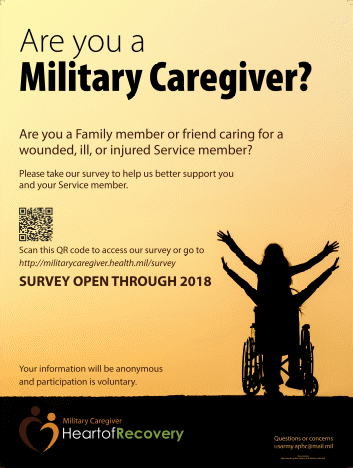
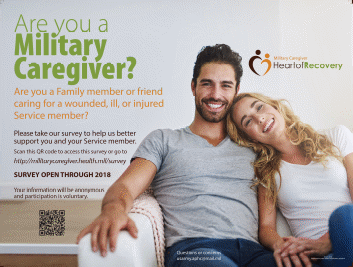
Appendix E: Article and Press Release
Military Caregiver survey opens at Ft. Bragg, NC, Ft. Sill, OK, Joint Base San Antonio, TX and Joint Base Lewis McChord, WA
More than 44 million Americans care for a family member, friend, or neighbor who is wounded, ill, or injured.
Within this population of caregivers is a group who needs to be identified for additional support—Military Caregivers. A Military Caregiver is someone who provides unpaid assistance to a wounded, ill, or injured Service member with activities they once did on their own, but are no longer able to do for themselves.
Impact of Caregiving
The effort caregivers provide is heroic and often unrecognized. Caregiver support helps speed recovery rehabilitation and reintegration. Unfortunately, this devotion often comes at a cost. According to the 2014-RAND Hidden Heroes Report, for example, post-9/11 military caregivers experience worse health outcomes, greater relationship strain and more workplace problems than pre-9/11 or civilian caregivers.
Nearly 40 percent of post-9/11 caregivers met criteria for depression, which is nearly four times higher than non-caregivers, and twice as high as pre 9/11 and civilian caregivers. The impact of caregiving affects more than just the caregiver. 44% of post 9/11 caregivers report that they spend less “quality” time with their children becausethey are busy caring for the care recipient.
The personal toll of providing this caregiving assistance is high; the impact of caregiving can often lead to reduced or lost income and high emotional stress. Especially important is the effect caregiving has on the health of the military caregiver over time.
Military Caregiver: Heart of Recovery Initiative
The Heart of Recovery Initiative, led by the Army Public Health Center (APHC) seeks to identify, empower, educate, and support the caregivers of active duty and Reserve Service members to improve their health and well-being and to reduce the risks associated with caregiving. The team’s goals include helping to achieve a healthy, fully supported, and well-trained Military Caregiver population and to provide a warm hand-off to either the VA Caregiver Program or support organizations in their local communities.
We need your help – Please take our survey if you are a Military Caregiver!
To understand the needs of caregivers, an anonymous survey will open April 16. The survey will be open to any Army Medical Health System beneficiary (for example, an Army spouse, adult child, or fellow Soldier) over the age of 18 who provides care to a wounded, ill, or injured Soldier at Fort Bragg, NC, Fort Sill, OK, Joint Base Lewis McChord, WA, and Joint Base San Antonio, TX. The Soldier receiving caregiver support may be in a Warrior Transition Battalion, or going through the Disability Evaluation System, or may be suffering from invisible wounds and not seeking care at all.
If you are a Caregiver living in or around one of these installations, we want to hear from you! Your participation in this anonymous survey is critical because it will help leaders understand how to standardize support and link caregivers with training, and medical, financial, legal, career, spiritual, and other services. You can find the survey at: http://militarycaregiver.health.mil/survey.
Where to Reach Out
Caregivers perform a difficult job, often with few resources, and deserve support for what they do. They have resilient spirits and do not need to go it alone. The Ombudsman serve as a local resource, facilitator, and problem solver for Service members and their Families, and can help our Caregivers get the resources that they need. For those Caregivers that aren’t near an installation with an Ombudsman, each branch of Service has a hotline number (listed below) to provide assistance.
The Secretary of Defense Warrior Care Office offers virtual and face-to-face PEER forums and a Caregiver Resource Directory at http://warriorcare.dodlive.mil/ .
Warrior Care and Transition provides support and training to WTU Caregivers and a link to Caregiver resources http://www.wct.army.mil/
For Soldiers enrolled in the Disability Evaluation System, The Soldier Family Assistance Center coordinates services for Soldiers and their Family members. https://www.armymwr.com/programs-and-services/personal-assistance/solderfamily-assistance-centers
The Heart of Recovery website includes useful resources, and you can find the anonymous Caregiver Survey on the site: http://militarycaregiver.health.mil/ The Community Resource Guide is a one-stop shop that helps community members quickly access resources at fifty installations worldwide to meet their particular needs. https://crg.amedd.army.mil/ .
The following phone numbers are available for military caregivers. Note: If you are experiencing a medical emergency, call 911 or contact your local hospital or Military Treatment Facility right away.
If you call the numbers below, do not provide personally identifying information other than your name and phone number or email address. If additional personal information is required to assist you, the hotline will request it after your initial contact.
ARMY WOUNDED SOLDIER AND FAMILY HOTLINE: 1-800-984-8523: Stateside DSN: 421-3700 | Overseas DSN: 312-421-3700
E-mail: mailto:[email protected]
NAVY SAFE HARBOR-SEVERELY INJURED SUPPORT
877-746-8563
AIR FORCE WOUNDED WARRIORS (AFW2)
800-581-9437
GENERAL ASSISTANCE AND CRISIS LINES
Deployment Health Clinical Center: 800-796-9699
Military One Source: 800-342-9647
National Suicide Prevention Hotline: 800-SUICIDE (784-2433)
Veterans Suicide Prevention Hotline: 800-273-TALK (8255)
MILITARY FAMILY CAREGIVER SURVEY OPENS AT FORT BRAGG, NC, FORT SILL, OK, JOINT BASE LEWIS MCCHORD AND JOINT BASE SAN ANTONIO TO SEEK INPUT FROM THOSE CARING FOR A WOUNDED, ILL OR INJURED SOLDIER
The US Army Medical Command, Army Public Health Center announced today the launch of a survey for Military Caregivers, those Army Medical Health System beneficiaries who provide assistance to a wounded, ill, or injured Soldier. The first phase of the survey will be open to ANY Active Duty Soldier, spouse, or child over the age of 18 who provides care to a wounded, ill, or injured Soldier. The Soldier receiving caregiver support may be in a Warrior Transition Battalion or going through the Disability Evaluation System or may be suffering invisible wounds and not seeking care at all. The survey will open to Army beneficiaries on __ at Fort Bragg, NC, Fort Sill, OK, Joint Base Lewis McChord (JBLM), WA, and Joint Base San Antonio (JBSA), TX and will remain open until ___ . Pending the Office of Management and Budget approval, a second phase of the survey will open to all Military Caregivers, regardless of their beneficiary status or the care recipient’s branch of service.
According to a 2014-RAND report on Military Caregiving, “Hidden Heroes”, spouses are the most likely group of caregivers followed by parents and friends. This second phase will allow the Army Public Health Center to collect information on other major Caregiver groups outside of the beneficiary population and caregivers providing care to Sailors, Airmen, and Marines.
“We know that our Military Caregivers have health concerns and needs of their own and while caregiving can be rewarding, it can also cause additional stress. We are excited to host this survey to learn more about our Military Caregivers and determine ways to best serve them,” said Mr. John Resta, the Deputy Chief of Staff for Public Health and Director of US Army Public Health Center. Our Military Caregivers improve the lives of our Soldiers and help speed recovery, rehabilitation, and reintegration. Unfortunately, their tremendous devotion often comes at a cost. Post 9/11 Caregivers suffer worse health outcomes, greater relationship strain and more workplace problems than pre 9/11 or civilian caregivers according to a recent RAND study. The 30 minute survey aims to supplement what was learned in the RAND report to understand the social, economic and health impact of caregiving and identify gaps in services. The Army Public Health Center urges Active Duty or Family member Caregivers at Fort Bragg, Fort Sill, JBLM, and JBSA to help us help you by completing the survey at: http://militarycaregiver.health.mil/survey. Thank you for taking valuable time out of your day to help us understand the needs of Military Caregivers and to provide information back to the Army to support Military Caregivers and the Soldiers for whom they are providing care.
Appendix F: Sample Email Content to Family Readiness Groups
To: Army Family Readiness Group Member
Subject: Are you a Military caregiver? We want to hear from you!
If you are a Caregiver, we need your input! The U.S. Army Public Health Center (APHC) is currently conducting a survey to better understand the unique needs and experiences of Military caregivers. Your input is needed so that we can identify resources and other assistance you would like to receive in future.
TAKE CAREGIVER SURVEY HERE! (provide link to survey)
A Military caregiver is someone who provides unpaid assistance to a Service member with activities they once did on their own but are no longer able to do for themselves. Some military caregivers may not think of themselves as caregivers. You may be a military caregiver if you provide or experience the following:
Assist a Service member with day-to-day activities such as eating, dressing, toileting, showering, etc.
Provide a Service member with emotional support
Advocate for new and better treatment for a Service member
Oversee legal or financial responsibilities for a Service member, due to a wound, illness or injury
Coordinate care (make doctor’s appointments or arrange for transportation to appointments, etc.) for a Service member
Miss work or change schedule to care for a Service member
Sometimes feel overwhelmed caring for a Service member
Help is just a call away! If you are a military caregiver and you need help, please use the following phone numbers which are staffed 24 hours a day, 7 days a week.
IMPORTANT: Do not use the following phone numbers and contacts to report medical/clinical information or real-time medical emergencies. If you are having an emergency medical situation, please call 911 and/or contact your local hospital
Army Wounded Soldier and Family Hotline: 1-800-984-8523; Stateside DSN: 421-3700; Overseas DSN: 312-421-3700; E-mail: mailto:[email protected]
Navy Safe Harbor-Severely Injured Support: 877-746-8563
For more information about Military Caregiver Heart of Recovery Program.
Advocate that caregivers are trained, informed and supported to be maximally effective and to mitigate the risks associated with or in
| File Type | application/vnd.openxmlformats-officedocument.wordprocessingml.document |
| Author | Kilby, Carrie A CIV (US) |
| File Modified | 0000-00-00 |
| File Created | 2021-05-28 |
© 2026 OMB.report | Privacy Policy

